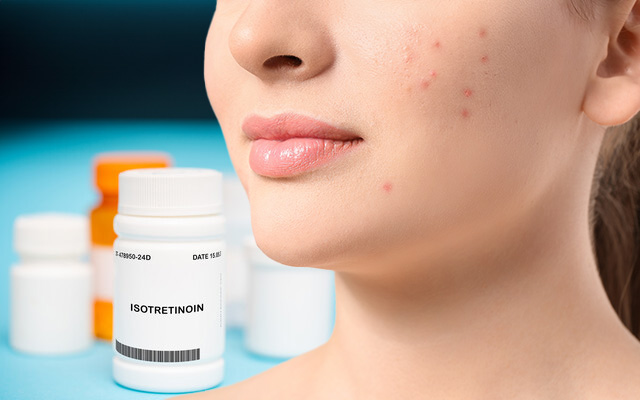Introduction to Isotretinoin
Buy Isotretinoin Online, also known by its brand names such as Accutane, Claravis, and others, is a potent medication primarily used to treat severe acne that has not responded adequately to other treatments. It belongs to a class of medications called retinoids and is derived from vitamin A. Isotretinoin works by reducing the production of sebum (skin oil), preventing clogged pores, and decreasing inflammation in the skin, leading to significant improvements in acne lesions.
Side Effects of Isotretinoin
Dryness of Skin and Mucous Membranes:
One of the most common side effects of isotretinoin is dryness, particularly of the skin, lips, and eyes. This can manifest as dry, flaky skin, chapped lips, and irritation or redness around the eyes. Using moisturizers and lip balms can help alleviate these symptoms.
Photosensitivity:
Isotretinoin can make the skin more sensitive to sunlight, increasing the risk of sunburn and sun damage. It’s important to use sunscreen with a high SPF and wear protective clothing when outdoors.
Muscle and Joint Pain:
Some individuals may experience muscle aches, joint pain, or stiffness while taking isotretinoin. These symptoms are usually mild and improve with time.
Vision Changes:
Rarely, isotretinoin can cause changes in vision, such as difficulty seeing at night or decreased tolerance to contact lenses. If you experience any vision changes, consult your healthcare provider.
Elevated Liver Enzymes:
Isotretinoin can affect liver function, leading to elevated liver enzymes in blood tests. Regular monitoring of liver function is necessary during isotretinoin treatment.
Mood Changes and Depression:
There have been reports of mood changes, including depression and suicidal thoughts, in some individuals taking isotretinoin. It’s essential to be aware of any changes in mood or mental health and seek medical attention if needed.
Gastrointestinal Symptoms:
Isotretinoin can cause gastrointestinal side effects such as nausea, vomiting, abdominal pain, and diarrhea. Taking the medication with food may help reduce these symptoms.
Hair Thinning:
Some individuals may experience temporary hair thinning or loss while taking isotretinoin. This typically resolves after completing treatment.
Increased Cholesterol and Triglycerides:
Isotretinoin can elevate blood levels of cholesterol and triglycerides, which may require monitoring and management, especially in individuals with pre-existing lipid disorders.
Birth Defects:
Isotretinoin is highly teratogenic, meaning it can cause severe birth defects if taken during pregnancy. It is contraindicated in pregnant women and requires strict contraception measures during treatment and for a period after discontinuation.
Interactions with Other Medications
Vitamin A Supplements:
Concurrent use of isotretinoin with vitamin A supplements should be avoided, as it can lead to excessive vitamin A levels in the body and increase the risk of toxicity.
Oral Corticosteroids:
Isotretinoin may interact with oral corticosteroids, leading to increased intracranial pressure. Close monitoring is necessary if both medications are used together.
Tetracycline Antibiotics:
Isotretinoin and tetracycline antibiotics should not be taken simultaneously due to the risk of increased pressure in the brain (pseudotumor cerebri).
Hormonal Contraceptives:
Isotretinoin can reduce the effectiveness of hormonal contraceptives (birth control pills, patches, implants, etc.). It’s crucial to use additional non-hormonal contraception methods while taking isotretinoin to prevent pregnancy.
Phenytoin and Carbamazepine:
Isotretinoin may alter blood levels of phenytoin and carbamazepine, which are medications used to treat seizures. Monitoring of blood levels and adjustment of dosage may be necessary.
Lipid-Lowering Medications:
Isotretinoin can increase lipid levels in the blood, so caution is advised when using lipid-lowering medications concurrently.
Warnings and Precautions
Pregnancy Risk:
Buy Accutane Online is contraindicated in pregnancy due to its teratogenic effects. Women of childbearing age must use two effective forms of contraception simultaneously at least one month before starting isotretinoin, throughout the treatment course, and for at least one month after discontinuation.
Mental Health Monitoring:
Patients taking isotretinoin should be monitored for mood changes, depression, and suicidal thoughts. Prompt evaluation and intervention are crucial if any mental health concerns arise.
Liver Function Monitoring:
Regular monitoring of liver function tests, including serum transaminases and lipid levels, is necessary during isotretinoin treatment.
Bone Health:
Isotretinoin may affect bone density, especially in adolescents. Monitoring bone health and providing adequate calcium and vitamin D intake are recommended.
Eye Health:
Patients may experience visual changes while taking isotretinoin. Regular eye exams and discontinuation of contact lenses if necessary are advised.
Avoiding Waxing and Dermabrasion:
Skin procedures such as waxing and dermabrasion should be avoided while taking isotretinoin, as the skin may be more fragile and prone to irritation.
Isotretinoin and Mental Health
While isotretinoin is primarily used to treat acne, there have been concerns about its potential impact on mental health, particularly regarding depression and suicidal ideation. Some studies have suggested a possible association between isotretinoin use and an increased risk of depression, although the evidence is not conclusive, and the overall risk remains low.
Patients and healthcare providers need to be vigilant about monitoring mental health during isotretinoin treatment. Patients should promptly report any mood changes, feelings of sadness or hopelessness, or thoughts of self-harm to their healthcare provider. Healthcare providers should conduct thorough assessments, provide support, and consider appropriate interventions if mental health concerns arise.
Isotretinoin and Pregnancy Prevention Program
Due to the high risk of birth defects associated with isotretinoin use during pregnancy, various countries have implemented strict pregnancy prevention programs for patients taking isotretinoin. These programs typically include:
Pregnancy Tests:
Women of childbearing age must undergo pregnancy tests before starting isotretinoin and regularly throughout the treatment course.
Contraception Counseling:
Healthcare providers educate patients about the importance of using two effective forms of contraception simultaneously and guide contraception methods.
Contraception Compliance:
Patients are required to confirm their understanding of contraception requirements and commit to using contraception as prescribed.
iPLEDGE Program (United States):
In the United States, the iPLEDGE program is a mandatory risk management program for isotretinoin. It involves registration, monthly online surveys, and compliance with contraception requirements for both patients and prescribers.
Conclusion
Isotretinoin is a potent medication with significant benefits in treating severe acne, but it also comes with potential side effects, interactions, and precautions that need to be carefully considered. Patients and healthcare providers should engage in thorough discussions about the risks and benefits of isotretinoin treatment, adhere to safety protocols, monitor for adverse effects, and ensure appropriate contraception and mental health support throughout the treatment course. By following guidelines and precautions, isotretinoin can be used safely and effectively to improve skin health and quality of life for patients with severe acne.





